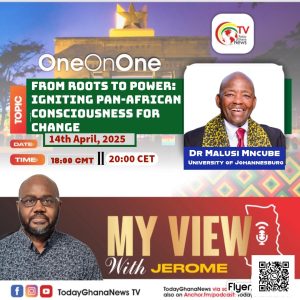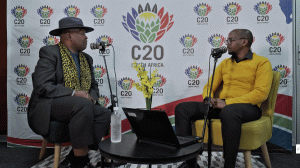This video segment presents a strong critique of historical and ongoing economic exploitation of Africa, with a focus on South Africa’s current situation and a prediction of future conflict.
Key Arguments:
- Historical Exploitation and Debt Dependency:
- The video argues that the US and Europe have historically exploited Africa’s resources, leading to a system of aid dependency that perpetuates economic control.
- It highlights the role of the US dollar in maintaining this dependency, as African nations are forced to rely on it for international trade and reserves.
- Reparations are demanded, not as a one-time payment, but as an ongoing acknowledgment of centuries of exploitation.
- South Africa’s Economic Landscape:
- The video contends that despite the end of apartheid, the South African economy remains controlled by a minority, excluding the black majority.
- The fight for “expropriation without compensation” is presented as a necessary step to address historical land theft.
- Concerns are raised about potential proxy wars and external interference in South Africa’s affairs.
- Global Economic Power Dynamics:
- The video emphasizes the imbalance of global economic power, with the US and China holding significant influence.
- It advocates for African unity and economic cooperation as a means to counter these power dynamics.
- Youth Empowerment and Action:
- The youth are urged to take a more assertive role in shaping South Africa’s economic future.
- They are encouraged to challenge existing power structures and demand economic control for the black majority.
- Emphasis is placed on the youth to understand how technology can be used to further oppress, and to be cautious of its use.
- Prediction of Future Conflict:
- The video predicts a racial and class-based war in South Africa within 20 years, driven by economic inequality and the black majority’s lack of control over key industries.
- This conflict is presented as an inevitable consequence of the failure to address historical injustices and current economic disparities.
Key Themes:
- Economic exploitation and dependency.
- Historical injustices and the need for reparations.
- The importance of economic control and self-determination.
- The role of youth in driving change.
- The potential for future conflict due to inequality.
- The dangers of technological advancement, when applied to a society with existing inequality.
The video presents a stark warning about the potential for future conflict if South Africa fails to address its economic inequalities and historical injustices.
Key Themes & Arguments
1. Imminent Racial & Class War in South Africa
- Historical Exploitation & Resource Theft: The US and Europe’s historical plunder of African resources has entrenched economic inequality.
- Minority Control of Economy: Despite political freedom post-apartheid, South Africa’s economy remains dominated by a white minority, fueling tensions.
- Expropriation Without Compensation: Land reform is necessary due to historical theft, but resistance from elites and foreign powers risks conflict.
- Proxy War Threat: The US and other Western powers may intervene to protect economic interests, destabilizing South Africa.
2. The Trap of Foreign Aid & Dollar Dependency
- Aid as Neo-Colonial Control: Western aid keeps Africa in a cycle of debt and dependency rather than fostering self-sufficiency.
- US Dollar Hegemony:
- African currencies are not internationally convertible, forcing reliance on the dollar for trade (e.g., oil, machinery).
- Countries must maintain Forex reserves, making them vulnerable to US economic policies.
- Breaking Free from Aid: Cutting US aid could be beneficial, forcing Africa to seek self-reliance and reject exploitative debt systems.
3. The Case for Reparations
- Historical & Ongoing Exploitation: The US and Europe owe Africa reparations for:
- Slavery & colonialism (millions of lives lost).
- Resource theft (gold, diamonds, oil, minerals).
- Intellectual & cultural extraction (patents, knowledge systems).
- Inflation-Adjusted Reparations: Payouts should reflect current economic value, not fixed historical sums.
- Continuous, Not One-Time Payments: Exploitation persists (e.g., corporate mining, trade imbalances), so reparations should be ongoing.
4. Global Economic Imbalances & Africa’s Weak Position
- IMF & World Bank Bias: The Global South (85% of the world) has <50% voting power, while the US controls key decisions.
- “Global Apartheid”: Rich nations block Africa from using tariffs, subsidies, and industrial policies—tools they once used to develop.
- Reverse Wealth Flow: Africa loses more money through unfair trade, debt, and corporate profit extraction than it receives in aid.
5. South Africa’s Economic Crisis & Youth Mobilization
- Failed Economic Transformation: Post-apartheid policies have not shifted wealth to the Black majority.
- Automation & Job Losses:
- Technology (e.g., retail automation, AI) benefits corporations but destroys jobs for the Black working class.
- Resist blind tech adoption that enriches elites while impoverishing masses.
- Call for Youth Revolution:
- Older leaders are too slow; young people must take control of politics and the economy.
- Demand land reform, nationalization of key industries, and economic policies that benefit the majority.
6. China’s Model & Africa’s Path Forward
- China’s Rise: Unified economic strategy lifted millions from poverty—Africa must emulate this.
- Intelligent Pan-Africanism:
- Economic unity (e.g., intra-African trade, shared infrastructure).
- Political collaboration (rejecting Western divide-and-rule tactics).
- CODESA 2.0 Proposal: A new national convention to address past injustices, but youth must lead, not wait for older generations.
7. Warning: The Coming Conflict
- 20-Year Forecast: If economic exclusion continues, a racial/class war is inevitable.
- Proxy War Risks: Foreign powers (US, UK, France) may fuel instability to maintain control over resources.
- Solution:
- Black economic empowerment (land, jobs, ownership).
- Reject foreign interference (aid, debt, corporate exploitation).
- Unite Africa against neo-colonial economic structures.
Conclusion: A Call to Action
South Africa—and Africa as a whole—faces a breaking point:
- Foreign aid and dollar dependency must end.
- Reparations, not charity, are owed.
- Youth must lead an economic revolution before inequality triggers violent conflict.
- Africa must unite or remain exploited by global powers.
Final Thought: “The 21st century belongs to Africa—but only if its people seize control of their resources, economy, and future.”
Discover more from Dr Malusi Mncube
Subscribe to get the latest posts sent to your email.




